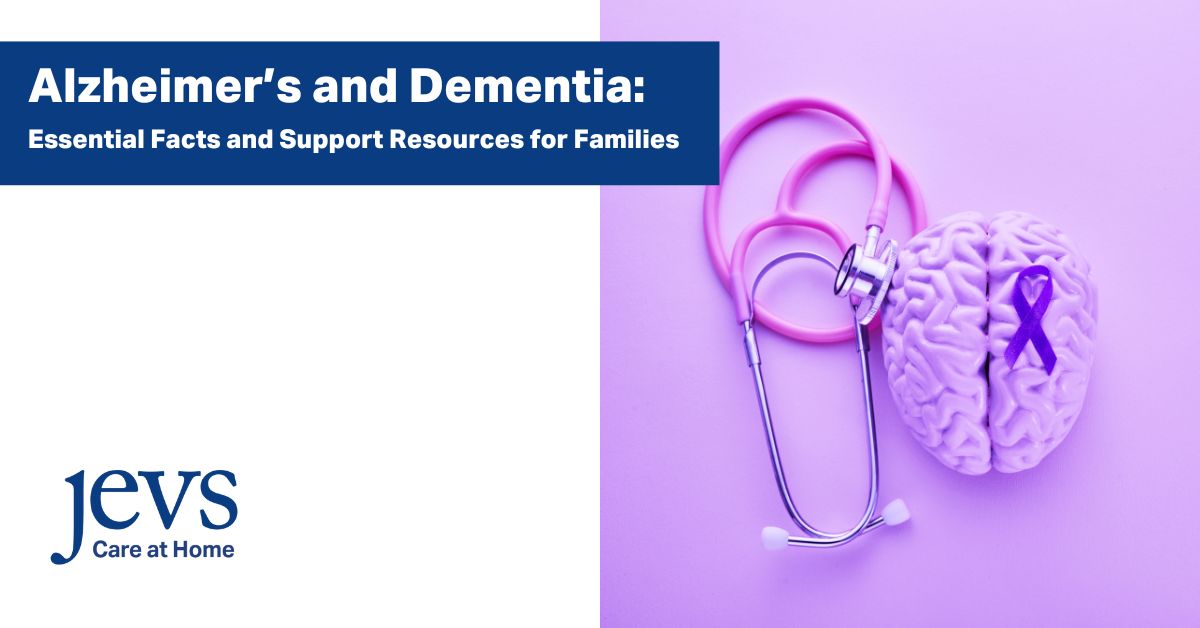By Thomas H.
It is very likely that Alzheimer’s disease will touch our lives in some way. Medical research has made significant progress in the diagnosis and management of this disease. However, cases are on the rise in the US, and Alzheimer’s remains uncurable.
To help increase awareness and do our part to support Alzheimer’s research, JEVS Care at Home is participating once again in the Walk to End Alzheimer’s. This annual event is sponsored by The Alzheimer’s Association and takes place this year on November 9. November is National Alzheimer’s Disease Awareness Month.
As we look ahead to participating in this year’s Walk to End Alzheimer’s, here are some essential facts about Alzheimer’s Disease and related dementias:
- More than 7 million Americans are living with Alzheimer’s and other dementias.
- In 2021, Alzheimer’s Disease was the 5th most common cause of death for people 65 years and older in the United States
- 1:3 Seniors die with Alzheimer’s disease or other dementias.
- Between 2000 and 2021 deaths from Alzheimer’s increased by 141%.
- Medical and long-term costs for people who suffer from dementia is project to hit $360 billion in 2024
[SOURCE: www.alz.org]
Alzheimer’s vs Dementia: what’s the difference?
Dementia is an umbrella term for a group of symptoms. According to the Alzheimer’s Association, “The characteristic symptoms of dementia are difficulties with memory, language, problem-solving and other thinking skills.” [SOURCE: Alzheimer’s Association, 2024 Alzheimer’s Facts and Figures]
Alzheimer’s is a progressive brain disease that causes dementia. When someone has Alzheimer’s, their brain changes. It begins producing an abnormal form of a protein called tau and an excessive amount of a protein fragment called beta-amyloid. Alzheimer’s disease also damages and destroys neurons, or nerve cells, in the brain. These changes contribute to dementia. Dementia that is caused by Alzheimer’s disease is called Alzheimer’s dementia. (SOURCE: Alzheimer’s Association, 2024 Alzheimer’s Facts and Figures)
What Causes Alzheimer’s Disease?
According to The National Institutes of Aging (NIA), scientists don’t fully understand what causes Alzheimer’s. The cause may be a combination of things, including age-related changes in the brain, genetics, and environmental & lifestyle factors. “The importance of any one of these factors in increasing or decreasing the risk of developing Alzheimer’s may differ from person to person,” says the NIA. [SOURCE: National Institutes of Aging “Alzheimer’s Disease Fact Sheet)
Signs of Alzheimer’s
The Alzheimer’s Association lists 10 signs that someone may be suffering from dementia or Alzheimer’s:
- Memory loss that disrupts daily life
- Challenges in planning or solving problems
- Difficulty completing familiar tasks
- Confusion with time or place
- Trouble understanding visual images and spatial relationships
- New problems with words in speaking or writing
- Misplacing things and losing the ability to retrace steps
- Decreased or Poor Judgement
- Withdrawal from work or social activities
- Changes in mood and personality
[SOURCE: Alzheimer’s Association: 10 Early Signs and Symptoms of Alzheimer’s and Dementia]
If you notice any of these signs, you should discuss them with your doctor immediately. If you notice them in a loved one, speak with them as soon as possible. The Alzheimer’s Society (UK) offers the following tips for speaking with someone when you are concerned that they may have dementia:
- Pick a place that is familiar and comfortable
- Choose a time when you won’t be rushed or interrupted
- Choose the words you use carefully
- Be positive
- Listen
[SOURCE: Alzheimer’s Society: Talking to someone about their memory problems]
You might begin the conversation by asking your loved one if they have been feeling differently or if they’ve noticed any changes in themselves. When you describe what you’ve observed, be reassuring and use non-judgmental language. Let them know you love them and are concerned, but don’t say that you are worried that they might have dementia or Alzheimer’s. This could confuse or frighten them. Be respectful and patient. Don’t be surprised or offended if your loved one dismisses your concerns or if they respond with annoyance. Accept that it may take time and more than one conversation before they are ready to seek help.
Resources for Alzheimer’s Patients and Caregivers:
The Alzheimer’s Association is a valuable resource for Alzheimer’s support, education, and advocacy. It offers a range of support and free services to help those who are facing the challenge of living with Alzheimer’s. Patients, their family members and caregivers in Pennsylvania can seek support through the following:
The Alzheimer’s Association’s free 24/7 Helpline (800.272.3900). Patients, their caregivers, and family members can use this service to connect with a live person who can provide information, local resources, crisis assistance, and emotional support.
The Alzheimer’s Association Delaware Valley Chapter serves Greater Philadelphia, the Lehigh Valley, Delaware, and southern New Jersey.
The Alzheimer’s Association Greater Pennsylvania Chapter serves western, central and northeastern Pennsylvania. The chapter has offices in Harrisburg and Pittsburgh, plus a network of staff and volunteers throughout the state.
Alzheimer’s and Dementia Capable Care at JEVS Care at Home
JEVS Care at Home supports many people with Alzheimer’s and other dementias. We provide training for our caregivers in Dementia Capable Care (DCC). DCC is an evidence-based dementia and behavior training program. It teaches caregivers how to deliver the special care that dementia sufferers need. The program focuses on ways to prevent and respond to many of the behaviors that are typical with dementia. These include confusion, agitation, and aggression. Caregivers who receive DCC have knowledge and skills that can help people with dementia live better lives at home.
For more information on our services, contact us today.
Posted in Blog JEVS Care at Home